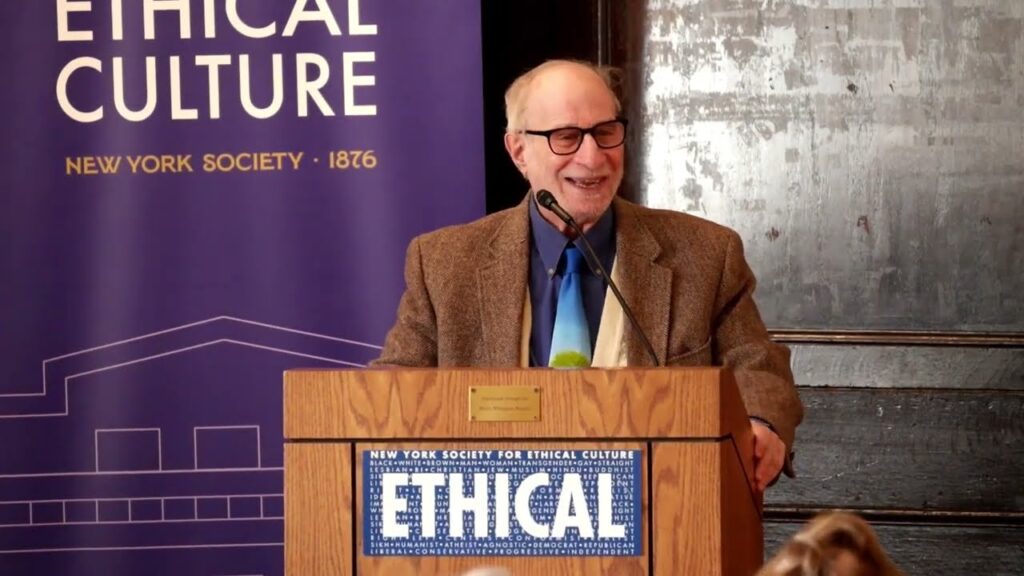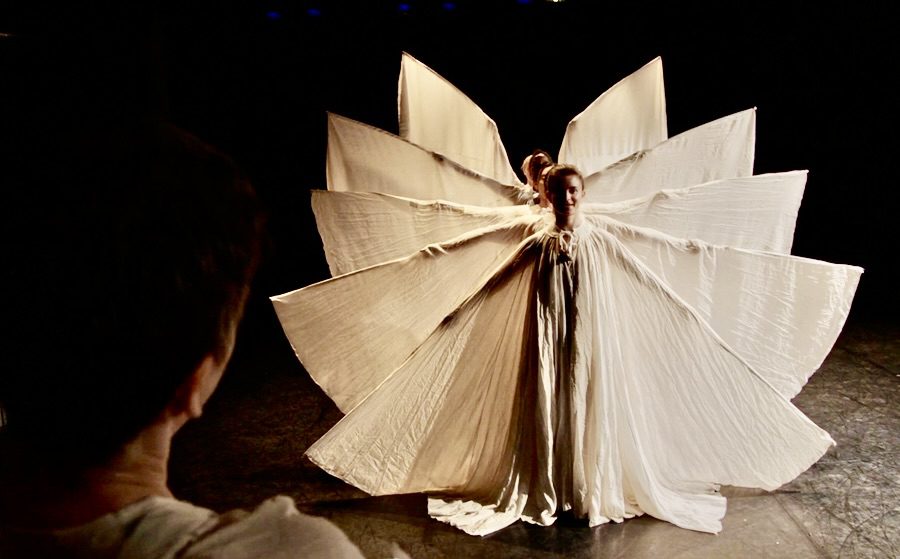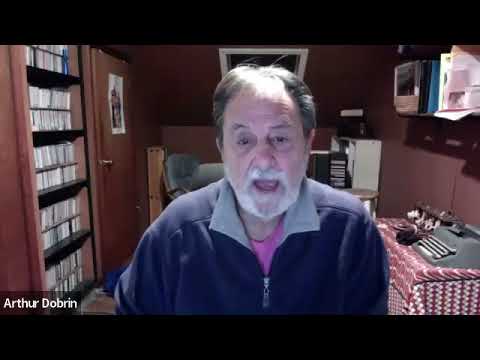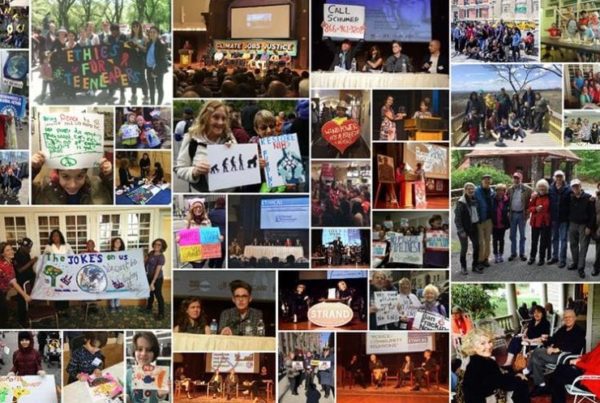
The latest Ethical Outlook Newsletter is online! Read below to see what the Society and our members have been doing to stay connected while apart.
Contents
From the Leader’s Desk | Upcoming Programs | Ask the Members | Community Circles | Upcoming Programs | Ethics in Action | What We’re Up To | Ethical Essentials Quiz | A Month in the Life of a Leader | Caring and Sharing | AEU | In The News | Our Ethical Family | Affinity Groups
From the Leader's Desk
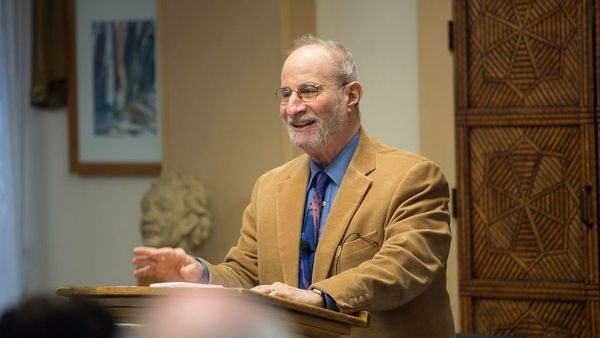
The Eroding Wall of Church-State Separation
By Dr. Joseph Chuman, Leader
The Supreme Court recently handed down decisions in three church/state cases. None of them should please us. There was a time when Ethical Culture saw separation of church and state as a major issue. We worked in coalition with Americans United for Separation of Church and State, and the AEU routinely passed resolutions affirming that position. I, at one time, was much more active in defending that cause. In trials brought by the ACLU I was a fact witness in defending separation, and I defended religious freedom in testimonies in the New Jersey legislature. I also advocated in other ways. But times change and other issues have moved to the fore.
However, I suspect that there are other reasons why church/state separation doesn’t grab our attention as it used to. One, lamentably, I surmise, is that the issue seems passé. In great measure the battle feels like it is over, and the positions we are now left to defend have been reduced to skirmishes rather than battles.
The issue is fought out primarily in the courts, which, having become much more conservative and responsive to the political power of the Christian right, favor religious freedom over other rights and interests. Today, if upholding the equality rights of a majority is seen as an affront to the “religious freedom” of a few, religion wins.
Increasingly religion is taking over public space. As I see it, there are two great causes for this, which, again, reflect the extraordinary power of religious conservatives. The first is a shift in judicial doctrine. The position I was reared on and socialized to defend was based on the principle that the state could not support religion, or for that matter, non-religion, and that religious doctrine could not be factored into law. The religions could be political actors and lobby for their positions just as anyone else, but sectarian belief could not be the basis of law and policy. In short, law and public policy must reflect a public and secular language accessible to all.
This was the position upheld by the judicial champions of separation such as Hugo Black, William O. Douglas, Thurgood Marshall, and New Jersey’s own William Brennan. But again, as a result of pressure from the right, the Supreme Court now grounds its decisions in a new doctrine, referred to as “accommodation.” While the Establishment Clause of the First Amendment still mandates that the United States not have an official church, short of that, that the state may support religion, including providing financial support, as long as it does not discriminate among the religions.
Let it be said that this is just what the founders did not want. For one thing, non-discrimination is a chimera. It is the powerful churches (read evangelicals especially) that receive government favors at the expense of minority churches, and with it there goes religious freedom.
A second major change results from the Religious Freedom Restoration Act (RFRA) of 1993, which dramatically alters the religious landscape. The RFRA was passed by Congress after the Supreme Court ruled that Indian tribes in Oregon could not use peyote, even though it has been part of their religious rituals for hundreds of years. The bill was supported by an almost unanimous majority of both liberals and conservatives in Congress. It states, “Government shall not substantially burden a person’s exercise of religion even if the burden results from a rule of general applicability.” What this means is that a religiously neutral law can burden a religion just as much as one that was intended to interfere with religion.
The Religious Freedom Restoration Act had unforeseen consequences in expanding religious turf tremendously into what were previously neutral and secular spaces. For example, the notorious Hobby Lobby case—which allowed a private corporation to withhold paying for contraceptive care of its employees because it offended the religious sensibilities of the owners— made ample use of the RFRA. Providing health care was seen as depriving employers of their religious freedom. (Confession: I originally supported the Religious Freedom Restoration Act. I now conclude it was one of the worst political mistakes I ever made.)
Back to the three current Supreme Court rulings:
- The first allows public monies to fund vouchers for religious schools. It is another nail in the coffin of public education and another victory for the destruction of the wall of separation. Accommodation-ism is assuredly in play.
- The second extends the scope of the Hobby Lobby case. The Court ruled that organizations affiliated with churches, such as schools and hospitals, do not have to provide contraceptives under the Affordable Care Act. Score another victory for religious conscience at the expense of up to 126,000 women, many poor, who will lose contraceptive care from their employers.
- The last case is somewhat more conceptually interesting. The Supreme Court ruled that religious organizations, such as schools, could discriminate against teachers, let’s say L.G.B.T.-identified. if it violated religious principles. There is a ministerial carve-out, and the Court sought to include teachers in a Catholic school under it. To a point, the ministerial exception makes sense. If a synagogue is seeking a new rabbi, the search committee, I think most would agree, has a right to reject an applicant who isn’t Jewish. But what about the teachers in religious schools? If we are talking about teachers instructing children in catechism, maybe. But math or English teachers?
The case was brought by two teachers at a Catholic school. Justices Ginsburg and Sotomayor dissented. Justice Sotomayor noted that the teachers in question taught prevailingly secular subjects. She wrote that “the decision would affect employees other than teachers,…coaches, camp counselors, nurses, social-service workers, in-house lawyers, media relations personnel, and many others who work for religious institutions.”
“All these employees could be subject to discrimination for reasons completely irrelevant to their employers’ religious tenets,” she wrote. “The inherent injustice in the court’s conclusion will be impossible to ignore for long, particularly in a pluralistic society like ours.”
I think she got it right. But such is the power of religion these days that it overwhelms other interests, including the right not to be the victim of discrimination.
What all this entails is that the battles to preserve what is left of the wall of separation of church and state will be fought on smaller terrain, and the conflicts will grow more severe. It took 300 years to put the tiger in the cage. Now we are confronted with the need to get it to go back in.
Ask The Members
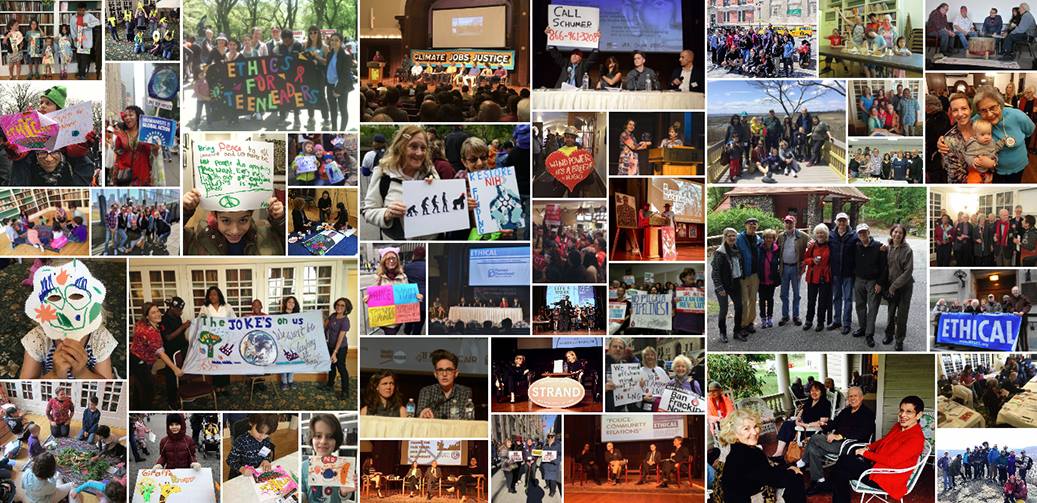
What have you noticed or discovered about yourself since this different sort of lifestyle has been in place?
By Maggie Determann, Membership Coordinator
I already knew, but I am reminded that I receive a great deal of joy connecting to family and friends. I have tried to find new ways to achieve that connection without compromising my or other’s safety. I have discovered that my love for learning is a gift. I can rely on my curiosity to keep me focused and satisfied given the increased number of hours that I am spending at home. Thank goodness for the internet! I have also found that I have a storage of resilience that is helping me adjust to the new “lifestyle.” Truth be told, however, I am not sure how long my “resilience reserves” can last. Most importantly, I count my lucky stars for what I have, rather than for what I have lost; that keeps me centered. My heart goes out to those who have had to face great challenges and significant losses during this pandemic.
—Sandi Sacks
I have noticed how people centered I am. Unless I have a conversation or two with a friend or two or three over the course of the day I do not do well. Also, I like organization and have talked to others to discover that they, too, make daily “To do” lists and have satisfaction in ticking them off, even if some of those “to do’s” now consist of 6 am: walk, 10 am: do exercise, 11 am: make salad for dinner, 2pm: Zoom, 3pm: call daughter, 4 pm: get grocery list together, 5pm: send birthday card to niece while tuning in to Zoom music. I am upset if I do not have a list or if I haven’t finished doing all the things on the list by the end of the day — unless the leftover is something that can be transferred to tomorrow’s list!
Must watch PBS news hour, and must read something besides the NY Times, preferably not on the pandemic or Trump. I read a lot and usually surprise my kids and granddaughters in that I have already read the book they are reading. (Just had a phone chat with my sixteen-year-old granddaughter about There, There and Gilead.)
—Ellen McBride
I’ve rediscovered some things. There’s the joy, really, of not multitasking, of giving my full attention to the task at hand. Since I’m not rushing to the next activity of the day, I can enjoy slow walks and even stopping to observe that bird or dog or flower along the way. At first, I couldn’t focus on reading; now I’m back to nice stretches of time engrossed in a book. I find myself getting more in tune, so to speak, with my personal rhythms; I eat when I’m hungry, sleep when I’m tired. And I’ve rediscovered the pleasure of silence, quietude, just sitting still for a while, usually outside.
—Elinore Kaplan
September — Same Question: What have you noticed or discovered about yourself since this different sort of lifestyle has been in place? Share your response! Send it to Elinore at ethicaloutlook@gmail.com.
Community Circles Are Opening Up!
What are Community Circles?
They are closed discussion groups of Ethical members that meet every month. Participants share their thoughts on ethics, values, and issues of a personal and general nature in our collective search for growth, understanding, and friendship. Pre-Covid, they also shared rugalach, chocolate babka, and wagashi.
Each new person commits to actively participate and stay with the group on the journey it undertakes.
Two Circles have been meeting for more than three years. The Daytime Circle, which meets on Tuesday afternoons at 4pm can accept new participants. A third Circle can be formed if there is enough interest.
For more information, email Leader Richard Koral: rkoral@nysec.org.
Upcoming Programs
For a full listing of all our online programs during the pandemic, visit our Ethical Online Live! listings or our full events calendar. We also email a Weekly Program Schedule, where, for applicable programs, you will find the topic and suggested reading of the week, and other additional information.
Weekdays – Caring Committee Living Room
Drop in for a chat and friendly face each weekday, 10:00am-1:00pm.
There are no upcoming events at this time
Mondays
Ethicists Unite! | 4th Mondays | 11am
Let’s discuss the ethical dilemmas you and others face. Sandi will also have some dilemmas from “The Ethicist” columns NY Times and other sources. Sandi Sacks moderates.
There are no upcoming events at this time
Managing in the Time of COVID-19 | Mondays | 2pm
COVID-19 has created challenges for all of us. Frank and Carol will address your concerns about managing day to day during this trying time. Moderators Dr. Frank Corigliano, clinical psychologist, and Dr. Carol Portlock, oncologist, alternate.
There are no upcoming events at this time
Tuesdays
Ethics in the News | Tuesdays | 2pm
Join in the lively give-and-take on compelling issues and current events. Weekly topics and suggested readings Joe Fashing moderates
There are no upcoming events at this time
Meditation Half-Hour | Tuesdays | 5pm
A midweek meditation for relaxing body and mind. Larry Hurst moderates.
There are no upcoming events at this time
Camaraderie and Good Conversation on Topics Philosophical and Newsworthy | 3rd Tuesdays | 7pm
We aim to illuminate the philosophical concepts and values that underlie the contemporary issues on which we focus in our discussions. Joe Chuman, Leader, moderates.
There are no upcoming events at this time
Wednesdays
Current Events Discussion and Debate | Wednesdays | 11am
Sy has been writing a weekly current events blog for several years, and his followers are many. In this program he presents a weekly topic and statements about it, all for discussion and debate. Sy Amkraut moderates.
There are no upcoming events at this time
Exploring Ethical Humanism | Wednesdays | 2pm
These discussions of Ethical Culture beliefs and practices are for newcomers and long-time members alike. We explore the history, ideals, and current interests of the Ethical Society community and our place in the philosophical/religious firmament. Leaders Dr. Joseph Chuman and Dr. Richard Koral alternate as moderators.
There are no upcoming events at this time
Great Literature Discussion | 1st & 3rd Wednesdays | 7pm
Read the selected works — great novels and novellas — in advance, and be prepared to share your thoughts and observations, discussing the aspects of interest to you by referring to and reading specific related text to the group. Based on what we find in the text, we enrich each other’s understanding and interpretation. Gunther Tielemans moderates.
There are no upcoming events at this time
Thursdays
Poetry Circle | 1st Thursdays | 2pm
Share the poems of your choice. Read them aloud. We’ll listen attentively and discuss some of them — a line, a word, an image. Tell us a little about the poets, too. Elinore Kaplan moderates.
Poetry Circle (Online)
Bring a favorite poem (or poems) to our monthly online poetry circle! Read it aloud, and we’ll listen attentively together and discuss—a line, a word, an image, or an overall...
Ethicists Unite! | 2nd Thursdays | 2pm
Let’s discuss the ethical dilemmas you and others face. Sandi will also have some dilemmas from “The Ethicist” columns NY Times and other sources. Sandi Sacks moderates.
There are no upcoming events at this time
Colloquy | 3rd Thursdays | 2pm
Share your reflections on the topic based on quotes, parables, poems, etc. presented by the moderator. There are no right or wrong answers, just your individual response shared in a contemplative atmosphere.
There are no upcoming events at this time
Getting to Know You | 4th Thursdays | 2pm
Get to know our Ethical Culture Family in a comfortable, casual way. In this session, two members dialogue with one another (or with one of the moderators). The “dialogue partners” respond to 4 or 5 questions they themselves have chosen (about growing up, career, interests, adventures… whatever; plus one about being a member of NYSEC). Larry Hurst & Elinore Kaplan moderate.
If you’d like to be a dialogue partner at one of our programs, Email editor Elinore Kaplan at Outlook at: ethicaloutlook@gmail.com
Getting to Know You (Members Only)
Get to know our Ethical Culture family in a comfortable, casual way. Each online session features a pair of members in a dialogue with one another, each responding to a...
Storytelling Circle | 1st & 3rd Thursdays | 5pm
One of the oldest traditions around the world is storytelling — folk tales, fairy tales, historic tales, family tales… Bring whatever story you choose, and we’ll gather ’round the virtual campfire and listen. Doris Hart moderates.
There are no upcoming events at this time
Music for the Spirit | Returns in September
An hour of delightful music. What a lovely way to end the day! David Gracia, Music Director, moderates. Tell David what you’d like to hear! Take this 4-question survey. David will try to accommodate your taste and requests.
Fridays
Proactive Meditation and Deep Listening | Fridays | 2pm
In this guided experiential session, we first take time to relax body and mind in order to sense how we really are in each moment. We allow ourselves to focus on listening deeply and empathically for what may be calling for our attention. We stay present with that. This proactive approach to meditating can open up fresh ideas and connections. Larry Hurst moderates.
There are no upcoming events at this time
Other Programs
Stoa Nova
This discussion group focuses on aspects of life that the Stoics dealt with so many years ago and are just as relevant and important today. It meets monthly on Monday evenings. Moderated by Prof. Massimo Pigliucci. Visit on Meetup.
There are no upcoming events at this time
Sunday Platforms
Join us to hear informed and inspiring speakers, including our own Leaders, while enjoying music provided by David Gracia, our Music Director.
Platform Plus | 12:15–12:45pm
Enjoy this purely social half hour to chat with one another after the Platform talk.
Sunday Platform with Robert Taylor Jr.: Creating Beloved Community
Discover practical tools for building meaningful connections, fostering self-awareness, and navigating difference with curiosity and compassion. Rooted in contemplative and breath-centered practices, we’ll explore techniques rooted in care that are...
New York, NY 10023 United States
Sunday Platform with Muriel Tillinghast: ‘Inside the Student Movement: The Life and Times in Activism’
Prior to the 1960s and continuing heavily through that period, working primarily with the Student Nonviolent Coordinating Committee (SNCC), Muriel Tillinghast had direct experiences in the Deep South. At times...
New York, NY 10023 United States
Sunday Platform with Richard Koral: ‘Growing, Becoming and Aging: A Striving for Wholeness in the Later Years of Life’
Details TBA. About Richard Koral Richard Koral is Leader at the New York Society for Ethical Culture and the Ethical Humanist Society of Long Island. He attended The Humanist Institute...
New York, NY 10023 United States
Sunday Platform with Carey Russell: ‘Land Ethics Trilogy, Part III’
Details TBA About Carey Russell Carey is a naturalist, photographer, and filmmaker. He founded The Dendro Lab, a platform to foster a broader public awareness of trees and forest ecology. As...
New York, NY 10023 United States
Sunday - Young Ethical Explorers

YEE, our Ethics for Children humanist Sunday School program, serves to empower youngsters in their ethical development, create life-long friendships, and stand up with care and courage for a better world. Following the words of our founder, Felix Adler, through kindness and deed they “bring out the best in one another, and thereby in themselves.” Topics are explored through discussion, storytelling, dramatization, music, art, games, and field trips.
 During these tumultuous times, Youth and Family Programs Coordinator Audrey Kindred is creating new online educational and enrichment opportunities for parents and children using Zoom! To RSVP, please contact Ethical NYC’s Youth Programs Director Audrey Kindred at youngethicalexplorers@gmail.com. For more information about all of our youth programming, please visit ethical.nyc/youth and YoungEthicalExplorers.blogspot.com.
During these tumultuous times, Youth and Family Programs Coordinator Audrey Kindred is creating new online educational and enrichment opportunities for parents and children using Zoom! To RSVP, please contact Ethical NYC’s Youth Programs Director Audrey Kindred at youngethicalexplorers@gmail.com. For more information about all of our youth programming, please visit ethical.nyc/youth and YoungEthicalExplorers.blogspot.com.
With the exception of our YEE First Sunday Festivals at 1:30pm, YEE meets at 11:00am, concurrent with our Sunday Platform talk.
There are no upcoming events at this time
Ethics in Action
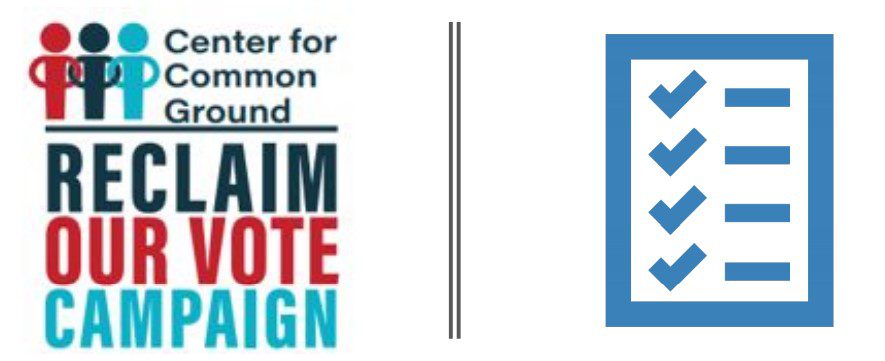
Reclaim Our Vote: Fight Voter Suppression from Home!
You can join Reclaim Our Vote and become a part of the nationwide action to fight voter suppression. Help us make a difference in the 2020 election.
To date, NYSEC members, along with members of the 4th Universalist Society, 12 Ethical Culture Societies and the AEU, as well as and friends, have mailed in the area of 40,000 postcards for the ROV campaign. Many other societies in the AEU are also participating. Do consider joining this vital postcard-writing campaign or making a donation to help support it.
Ethical Action Committee member Janet Rose is creating packets for postcard writers that get delivered weekly by volunteer bikers and walkers. The packets consist of specially created postcards, a very short script to be handwritten, a list of addresses, plus stamps and labels that give the recipient information about how to check their status and register, get mail-in ballots, or complete a “Pledge to Vote,” which gives the NAACP their information for updated poll closings and/or rides to polls.
Request a packet by emailing Janet at jrose@nysec.org
***
A Message from Laura Hembree,
Manhattan Regional Coordinator, Reclaim Our Vote
Since 2017, 16.6 million voters of color have been removed from the voting roles.
In 2013 the Supreme Court devastated voter protection for millions of Americans by striking down key provisions of the 1965 Voting Rights Act. Since then it’s been a voter suppression free-for-all.
Statistics show these new repressive laws overwhelmingly target minorities. Over 1,000 polling places in minority communities have been closed; millions of names of minority and young voters have been purged.
Reclaim Our Vote, (ROV) is a volunteer-driven, non-partisan 501(c)3 voter outreach campaign empowering voters of color in voter-suppression states to register and vote. ROV works with volunteers who, through post-carding, phone-banking and texting, contact under-represented, de-registered voters of color with information where to register locally.
ROV partners with groups on the ground in areas ROV is targeting. This strategy helped flip Virginia and was critical in 2017 to electing Doug Jones, Alabama’s first Democrat in the Senate in over 2 decades. Had ROV not specifically worked in Alabama’s Black Belt — a rural area ignored by both parties — Doug Jones’ win, with only 22,000 votes, may not have occurred.
Depending on the state, ROV has increased voter turnout by winning margins in targeted areas. Partnering with the NAACP, Mi Familia Vota and other groups, ROV is have sent thousands of postcards to de-registered voters of color in specifically targeted counties in Alabama, Texas, North Carolina, Mississippi, and Georgia. Currently, we are post-carding and phone-banking active voters to help them through the new and confusing maze of voting rules since COVID-19.
Since January we’ve sent out 2.3 million handwritten postcards and made 234,000 phone calls. There is no question that our over half a million postcards and our 122,000 calls to Georgia fueled the remarkable turnout of voters of color despite the long lines.
Come join us in what will be an historic election for our country.
YOU can be part of this nationwide action! YOU can make a difference!
What We're Up To
Chuck’s Photos
Inveterate hobbyist photographer Chuck Debrovner has been at it recently in the height of the summer’s beauty.
Share your news. Email Elinore, Outlook editor, at ethicaloutlook@gmail.com
Ethical Essentials Quiz: Do You Know?
The story of the New York Society for Ethical Culture is remarkable and fascinating. But how much do you know about it? Here below, and in each forthcoming issue of Outlook, you will see a question about the Society, focusing variously on its history, members, events, and milestones.
July’s question: Who was Anna Garlin Spencer?
Winning reply: Received from Society member Henryka Komanska…
 I refreshed my knowledge about Anna Garlin Spencer. I knew that she was the first female Ethical Culture Leader and that she was a social reformer and had contributed to founding of the NAACP. From Wikipedia, I found out that she started as Unitarian minister and was the first female minister ordained in Rhode Island. She was a leader in the women’s suffrage and peace movements. Here’s a quote of hers that I like: “It is an old error of man to forget to put quotation marks where he borrows from a woman’s brain!”
I refreshed my knowledge about Anna Garlin Spencer. I knew that she was the first female Ethical Culture Leader and that she was a social reformer and had contributed to founding of the NAACP. From Wikipedia, I found out that she started as Unitarian minister and was the first female minister ordained in Rhode Island. She was a leader in the women’s suffrage and peace movements. Here’s a quote of hers that I like: “It is an old error of man to forget to put quotation marks where he borrows from a woman’s brain!”
August Question: Ethical Culture was an active participant in the formation of the NAACP. In fact, two members of the NAACP’s first Board of Directors were E.C. members. Who were they?
Submit your answer to today’s question to Ethicaloutlook@gmail.com, and in next month’s issue we’ll print the names of those giving the most relevant and informative answers along with a summary of that information.
Note to readers: August 18, 2020 marks the 100th anniversary of the ratification of, the 19th amendment granting women the right to vote.
A Month in the Life of an Ethical Culture Leader
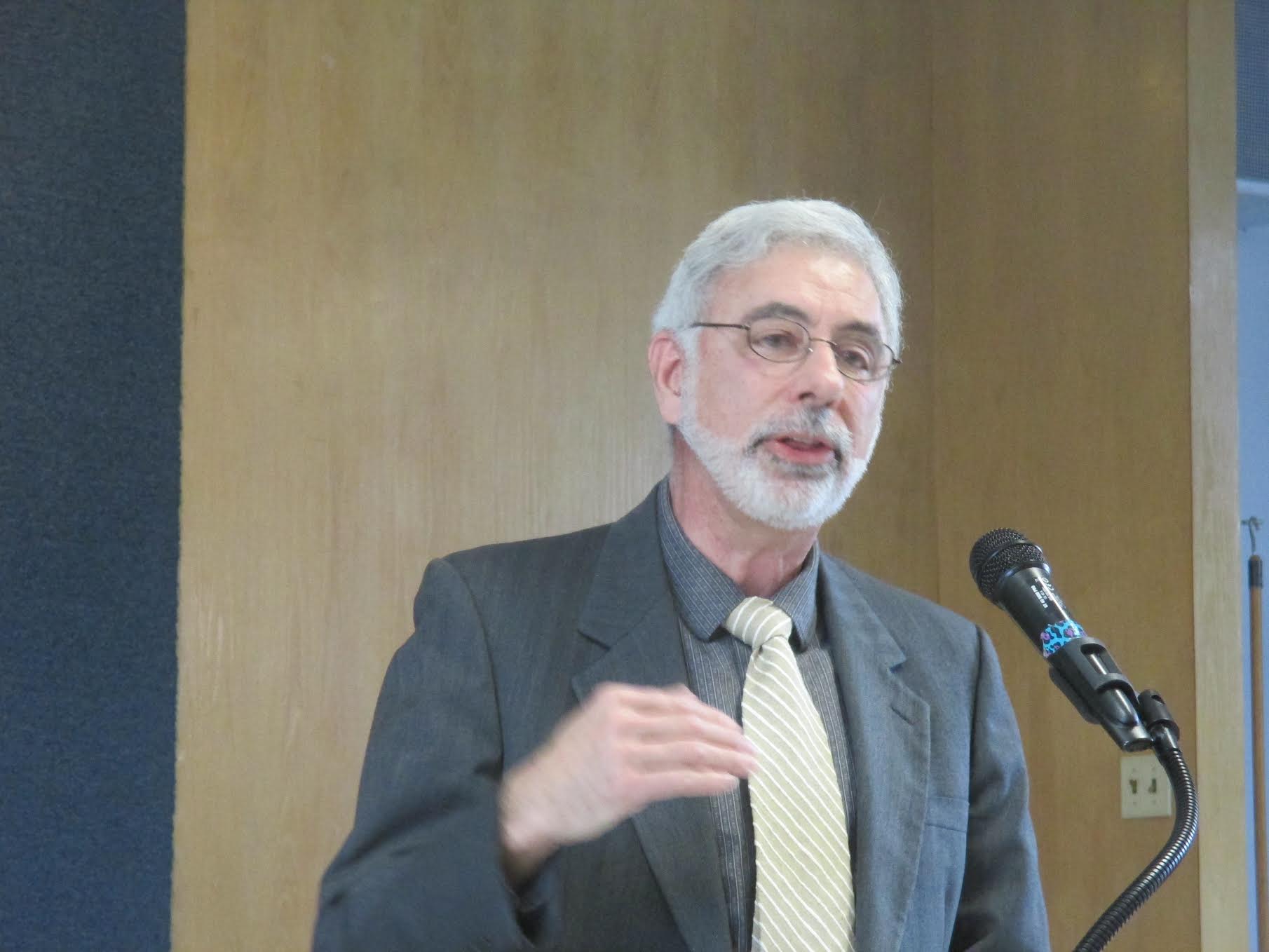
Some of those who looked at the Leaders’ monthly reports filed with the Board of Trustees were surprised to learn that the Leaders’ functions are so wide ranging and that they are involved in every aspect of the Society. It was suggested that other members, too, would like to see what a Leader does over the course of a month. From the June 2020 report, we learned the following about where leadership duties took Leader Richard Koral.
We think of Platform as the principal point of contact with the Leader. On June 28, Richard gave a Platform address titled “The Arrow of Time,” which was a meditation on the nature of time imagined while waiting for the Covid infections to blow over. On June 21, Richard served as Sunday Presider and gave welcoming remarks that morning.
Well, that was only part of it. There was more:
Richard serves as advisor to the Caring Committee. He attended their two meetings in June, each featuring outside speakers. He helped with the Committee’s calls to members and filled in from time to time in the Living Room on weekday mornings.
Richard facilitates the Community Circles, which are small, on-going groups that typically meet once a month, although now they are meeting bi-weekly.
Richard also participates on several other committees including Membership (monthly), Strategic Planning Committee (weekly), ECF [Ethical Culture/Fieldston] School/Society Coordinating Committee (weekly), Interim Programs (bi-weekly), Sunday Programs (monthly), Communications (monthly). For Financial Development committee, he drew up the first drafts of letters to the membership, and for the Ethical Enrichment committee, he created a program called “Exploring Ethical Humanism.” Since the Covid period began, it’s been meeting weekly on Wednesdays; Richard alternates with Joe Chuman making the weekly presentations. On June 3, for example, Richard’s program explored the thematic difference between a religious world view and a Humanist world view, and on June 17 the topic was the numerous organizations that are active within the broader Humanist community of today.
Richard also attends the Staff meetings (weekly).
Ethical Outlook has a “From the Leader’s Desk” column. In June Richard’s column was entitled “The Day the Earth Stood Still.” These columns are drafted a month in advance, Richard’s one month and Joe Chuman’s the next. With the onset of the pandemic, Outlook became a bi-weekly for April, May, and June, so Richard and Joe were doing double duty. Richard is also one on the team of proofreaders for Outlook.
Richard also attends the AEU monthly meetings with the public relations agency and confers with the agency about timely ethical issues that could be brought to news outlets.
Pastoral duties on behalf of the Society call upon Richard to personally speak with individual members from time to time, and to conduct ceremonies and services. In fact, he conducted an Ethical Culture wedding in June. (It had originally been planned as a big catering hall affair but was re-configured into a small family gathering in a parents’ back yard.)
Richard participated in the NYSEC Board meeting on June 8 and made opening remarks.
Richard attended Building Committee meetings and met with the neighboring YMCA representatives on a weekly basis to help oversee the renovation work the Y is undertaking on the abutting wall. He reviewed the license agreement prepared to permit the Y to operate from the Society’s roof, as well as the insurance documentation from the Y and its subcontractors.
He joined with Bob Liebeskind and Liz Singer in meetings with our principal renters – Redeemer Church, Visions Church, Calvary Church, and Chosen People Synagogue — to discuss their plans for resuming operations in our building.
With the AEU, Richard coordinated the scheduling of summer Platforms for Movement-wide sharing. NYSEC will participate on August 23, by inviting everyone to join us that Sunday.
With the N.Y.S. Council of Churches, he attended a seminar on congregational re-opening and another on maximizing the use of church buildings for community outreach.
“Is that all?” you ask, probably having difficulty envisioning one person doing all this.
No.
Richard also serves as consultant to the Social Service Board (SSB) and is on their subcommittee to oversee the Supportive Televisiting service (STV). In June, Richard attended the monthly SSB meeting, and he conferred with the SSB officers on several occasions. For the STV program, he attended three meetings on registering with the Department of Education as a service provider, and also helped interview two candidates for a Post-Doctoral psychologist position working with the program in the Fall. He also participated in a strategy meeting concerning the future of the Women’s Shelter and possible improvements that can be made to our shelter and to the program.
Well, that was for June. For the New York Society of Ethical Culture.
In case you didn’t know, Richard is part-time Leader for the Ethical Humanist Society of Long Island. But that’s another story.
Ethical Culture In The News
New York Society for Ethical Culture
& Ethical Culture Society of Bergen County
For the second month in a row The Hill has published an op-ed by Leader Joe Chuman. Entitled “As Coronavirus Surges, Trump Tried to Dismantle Healthcare for Millions,” the piece points out the moral failings of the Trump Administration’s recent attempt to dismantle the Affordable Care Act:
As a leader in the Ethical Culture movement and as a professor of human rights at Columbia University, I am most concerned with the ethical consequences of Trump’s and his Republican colleagues’ initiative to destroy the ACA. Both Ethical Culture and the study of human rights make the preservation of dignity their central priority. A society committed to human flourishing — which entails recognition of economic rights — is among our highest concerns.
“The American Slavery Project is teaming up with a consortium of award-winning Black theater companies, the New York Society for Ethical Culture and other allied institutions to present “Black Women and the Ballot,” a series of short radio plays to celebrate Juneteenth. The performance examines African-American women’s contribution to suffrage over multiple decades and the undocumented and disenfranchised black immigrant women overlooked today,” Judy Tate.
“Facing the coronavirus lockdown, Tate [Judy Tate, playwright] said she noticed people were starved for performance art as theater houses and other cultural institutions shuttered. She teamed up with a group of black theaters and other organizations, including the New York Society for Ethical Culture, to create the production.”
Susquehanna Valley Ethical Society
“Typically we are out in our community working on these projects, but with COVID-19, we don’t meet physically right now (at its Lewisburg headquarters),” said Arduini. “Our AEU decided we can’t be silent, we can’t take this break because of COVID. We were in search of something we could participate in while still in our homes.” –Pattie Arduini
“Fighting back against suppression starts with knowledge. In most cases, voters who are purged are not notified until it’s too late. Campaigns like Reclaim Our Vote work to notify eligible voters in states with a history of suppression that they may have been removed. My congregation, and others under the umbrella of the American Ethical Union, are working with ROV to send postcards to people in six states where voters may have been purged. Last year, more than one in five postcards sent to residents of North Carolina’s 3rd congressional district by ROV resulted in voter registrations.” –Pattie Arduini
Ethical Culture Society of Northern Westchester
Patch Ossining has published a story about the romance of Carol Ryan and Cliff Peterson. Both had attended Ramapo college, she as a student, he as a professor, although their paths hadn’t crossed. They met after Cliff read Carol’s responses to a questionnaire sent on the college’s 50th anniversary, and followed up with a call. The description of their wedding included this:
The remote officiants were Professor Anthony Padovano, theologian and author who taught Ryan’s first class at Ramapo College…and Robert Berson, head of the Ethical Culture Society of Northern Westchester, where Ryan is a longtime member (“the values of that group mirror her values and mine”).
AEU News
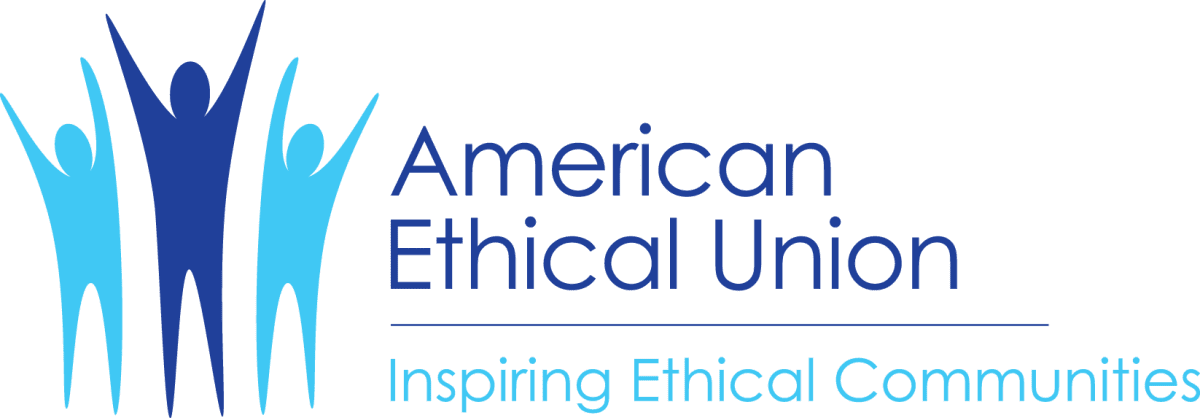
Rising to the pandemic challenge, the AEU held its 105th Annual Assembly virtually this year and took advantage of “Zooming” by spreading it out across most of July with business and educational programs and the culminating event, a Sunday Platform for all the Societies on August 2. Because of the convenience of attending from home, hundreds of members from Societies across the country were able to participate.
This would be a good time to remind ourselves of the importance of the American Ethical Union, the federation of Ethical Societies across the country. Visit the AEU website now, and return to it frequently to keep up to date on what’s happening at the heart of the continuing Ethical Culture Movement and at the various Societies: https://aeu.org/who-we-are/mission-vision/. Front and center, under “About” at the homepage are the mission and vision of the AEU:
The American Ethical Union creates, nurtures, and inspires ethical humanist communities to foster a world that is democratic, compassionate, just, and sustainable.
Ethical Humanism/Ethical Culture is a humanist Movement focusing on human goodness and building ethical relationships with each other and the Earth. As a non-theistic organization, we do not concern ourselves with the existence or non-existence of a deity but instead embrace the diversity of our membership.
- We recognize the unique worth and dignity of all people regardless of their race, ethnicity, sexual orientation, sexual identity, economic status, level of ability, or religious beliefs.
- We advocate for reason, compassion, and rational thinking so we can progress as individuals, communities, and a world.
- We act to elicit the best in others and thereby in ourselves, celebrating with and supporting each other through life.
- We realize the full capacity of our human spirit when we stimulate our thinking with new insights and inspirations.
- We are recognized as a religious movement because for us the ethical quest has the depth of a religious commitment, and because we recognize the value of a community of support, celebration, and action.
- We train future humanist leaders to promote responsible and ethical living.
Caring & Sharing
The John Lennon Tree
 This photo of appeared in the West Side Rag on June 30th with an article by Mary Pleshette Willis. The Lennon Tree Project, the idea of community artist Carmen Paulino, resulted in this beautiful crocheted piece wrapped around a tree on West 72nd Street between Amsterdam and Broadway, a block west of the Dakota, where Lennon lived. For obvious reasons, it brings a smile to passersby.
This photo of appeared in the West Side Rag on June 30th with an article by Mary Pleshette Willis. The Lennon Tree Project, the idea of community artist Carmen Paulino, resulted in this beautiful crocheted piece wrapped around a tree on West 72nd Street between Amsterdam and Broadway, a block west of the Dakota, where Lennon lived. For obvious reasons, it brings a smile to passersby.
Our Ethical Family
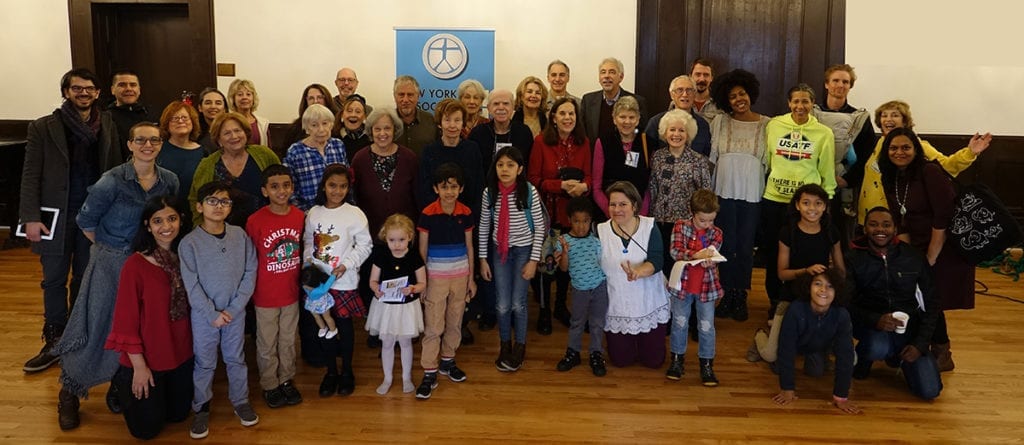
Happy Birthday! August Birthdays
Susan Needles…..8/3
David Lee and Anita Rao…..8/6
Nicola DeMarco …..8/7
Leslie Doyle…..8/10
John Lovelady and Liz Singer…..8/11
Carol Van Deusen….8/19
Lily Friedman….8/20
Mindy Rhindress, Sondra Stein, and Jane Ungar….8/29
Ethical Affinity Groups
SOCIAL JUSTICE
American Indian Community House | Amnesty International | Feminist Freethinkers | Formerly Fundamentalists | League of Women Voters | Police Reform Organizing Project | Radical Age Movement
ENVIRONMENTAL
350NYC | Climate Reality Project | Drawdown NYC | Food & Water Watch | NYC Grassroots Alliance










 As a leader in the Ethical Culture movement and as a professor of human rights at Columbia University, I am most concerned with the ethical consequences of Trump’s and his Republican colleagues’ initiative to destroy the ACA. Both Ethical Culture and the study of human rights make the preservation of dignity their central priority. A society committed to human flourishing — which entails recognition of economic rights — is among our highest concerns.
As a leader in the Ethical Culture movement and as a professor of human rights at Columbia University, I am most concerned with the ethical consequences of Trump’s and his Republican colleagues’ initiative to destroy the ACA. Both Ethical Culture and the study of human rights make the preservation of dignity their central priority. A society committed to human flourishing — which entails recognition of economic rights — is among our highest concerns.
 “The American Slavery Project is teaming up with a consortium of award-winning Black theater companies, the New York Society for Ethical Culture and other allied institutions to present “Black Women and the Ballot,” a series of short radio plays to celebrate Juneteenth. The performance examines African-American women’s contribution to suffrage over multiple decades and the undocumented and disenfranchised black immigrant women overlooked today,” Judy Tate.
“The American Slavery Project is teaming up with a consortium of award-winning Black theater companies, the New York Society for Ethical Culture and other allied institutions to present “Black Women and the Ballot,” a series of short radio plays to celebrate Juneteenth. The performance examines African-American women’s contribution to suffrage over multiple decades and the undocumented and disenfranchised black immigrant women overlooked today,” Judy Tate.
 “Facing the coronavirus lockdown, Tate [Judy Tate, playwright] said she noticed people were starved for performance art as theater houses and other cultural institutions shuttered. She teamed up with a group of black theaters and other organizations, including the New York Society for Ethical Culture, to create the production.”
“Facing the coronavirus lockdown, Tate [Judy Tate, playwright] said she noticed people were starved for performance art as theater houses and other cultural institutions shuttered. She teamed up with a group of black theaters and other organizations, including the New York Society for Ethical Culture, to create the production.”
 “Typically we are out in our community working on these projects, but with COVID-19, we don’t meet physically right now (at its Lewisburg headquarters),” said Arduini. “Our AEU decided we can’t be silent, we can’t take this break because of COVID. We were in search of something we could participate in while still in our homes.” –Pattie Arduini
“Typically we are out in our community working on these projects, but with COVID-19, we don’t meet physically right now (at its Lewisburg headquarters),” said Arduini. “Our AEU decided we can’t be silent, we can’t take this break because of COVID. We were in search of something we could participate in while still in our homes.” –Pattie Arduini
 The remote officiants were Professor Anthony Padovano, theologian and author who taught Ryan’s first class at Ramapo College…and Robert Berson, head of the Ethical Culture Society of Northern Westchester, where Ryan is a longtime member (“the values of that group mirror her values and mine”).
The remote officiants were Professor Anthony Padovano, theologian and author who taught Ryan’s first class at Ramapo College…and Robert Berson, head of the Ethical Culture Society of Northern Westchester, where Ryan is a longtime member (“the values of that group mirror her values and mine”).
